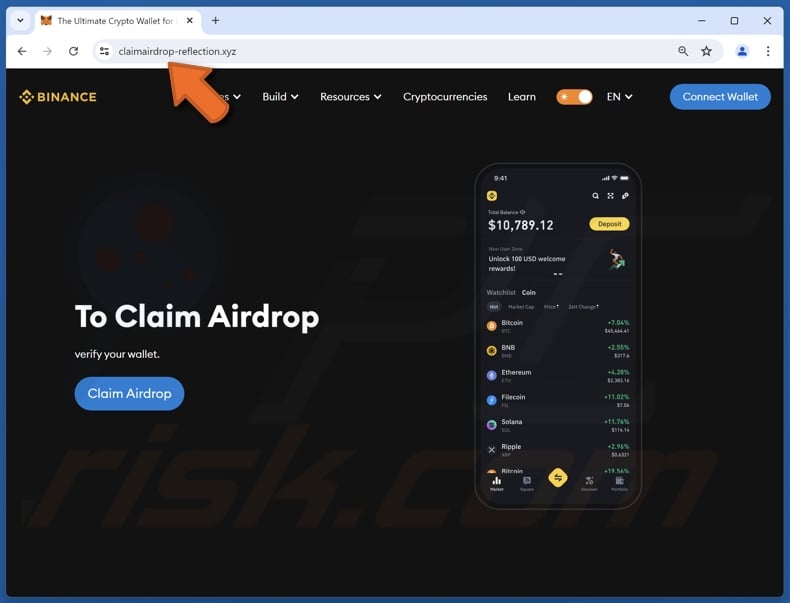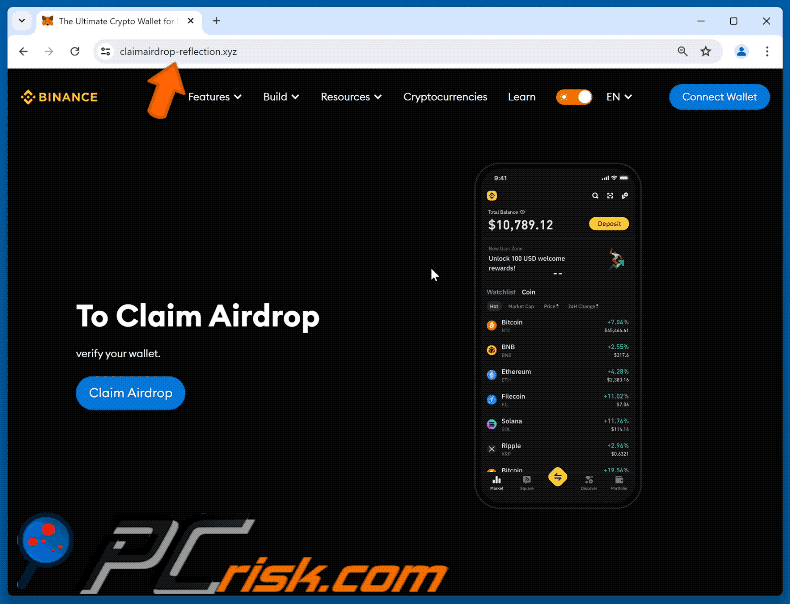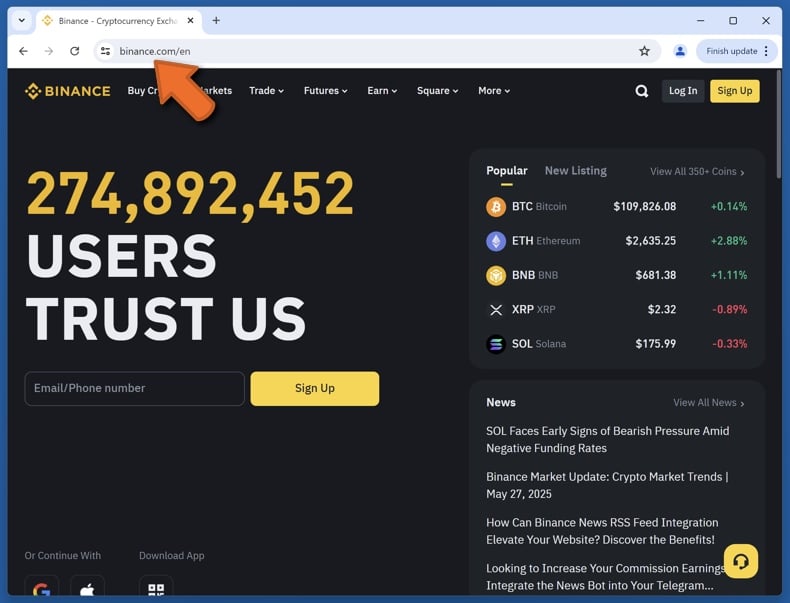How to recognize fake Binance airdrops
Phishing/ScamAlso Known As: "Binance Airdrop" crypto drainer
Get free scan and check if your device is infected.
Remove it nowTo use full-featured product, you have to purchase a license for Combo Cleaner. Seven days free trial available. Combo Cleaner is owned and operated by RCS LT, the parent company of PCRisk.com.
What is the fake "Binance Airdrop" website?
Our research team discovered this fake "Binance" airdrop during a routine investigation of suspicious websites. The deceptive page promotes a cryptocurrency drainer, which operates by draining funds from exposed digital wallets. It must be stressed that this scam is not associated with Binance Holdings Ltd. or any other legitimate platforms and entities.

IMPORTANT NOTE: We do not review crypto projects, please do your own research when investing money.
Federal Trade Commission (FTC) states that since the start of 2021, more than 46,000 people have reported losing over $1 billion in crypto to scams – that's about one out of every four dollars reported lost, more than any other payment method.
Fake "Binance Airdrop" website overview
We found this scam on claimairdrop-reflection[.]xyz, yet it could also be endorsed on different domains. The fraudulent page is disguised as the website of the Binance cryptocurrency exchange. It lures users with the promise of an airdrop. It must be reiterated that this airdrop is fake, and this scam is in no way associated with the real Binance Holdings Ltd.
The deceptive webpage instructs the user to verify their cryptowallet by connecting it in order to participate in the airdrop. Doing so signs a malicious contract that facilitates the cryptocurrency drainer. Essentially, the victim's funds are transferred to wallets in the scammer's possession.
These transactions are automated and may appear innocuous; thus, they can remain unnoticed for a significant amount of time. Some drainers can roughly estimate the worth of digital assets and prioritize the theft of those with the highest value.
It must be mentioned that cryptocurrency transactions cannot be reversed due to their practically untraceable nature. Therefore, victims of scam like this fake "Binance Airdrop" site cannot recover the stolen funds.
| Name | "Binance Airdrop" crypto drainer |
| Threat Type | Phishing, Scam, Social Engineering, Fraud, Cryptocurrency Drainer |
| Disguise | Airdrop on the Binance exchange. |
| Related Domains | claimairdrop-reflection[.]xyz |
| Detection Names | Trustwave (Phishing), Webroot (Malicious), Full List Of Detections (VirusTotal) |
| Serving IP Address | 206.217.128.210 |
| Distribution methods | Compromised websites, social media spam, rogue online pop-up ads, potentially unwanted applications. |
| Damage | Monetary loss |
| Malware Removal (Windows) |
To eliminate possible malware infections, scan your computer with legitimate antivirus software. Our security researchers recommend using Combo Cleaner. Download Combo CleanerTo use full-featured product, you have to purchase a license for Combo Cleaner. 7 days free trial available. Combo Cleaner is owned and operated by RCS LT, the parent company of PCRisk.com. |
Cryptocurrency drainer scam examples
We have analyzed countless online scams; "loopedHYPE (LHYPE) Airdrop", fake "HyperLend" website, and "1inch Airdrop" are just a few of our newest articles on drainers. The primary ways that crypto scams operate include utilizing draining mechanisms, phishing for wallet log-in credentials, or deceiving users into manually transferring funds to scammer-owned wallets.
Online scams are often poorly put together and riddled with mistakes, but they can be competently crafted and convincingly disguised as content associated with legitimate entities. Cryptocurrency-specific scams have a reputation for believably pretending to be genuine sites and platforms. Therefore, we highly recommend vigilance when browsing and investing.
How did I open a scam website?
Crypto drainers are commonly endorsed via malvertising, specifically – intrusive pop-up advertisements. They might function as drainers themselves (i.e., be capable of executing draining scripts). These ads may be encountered on legitimate websites that have been compromised. Another prevalent technique is social media spam.
Promotional posts and private/direct messages (PMs/DMs) can be made using hacked accounts (i.e., ones originally belonging to real projects, companies, entrepreneurs, celebrities, influencers, etc.). Should a promoted scam align with the content ordinarily posed by the account – it would create an incredible impression of legitimacy.
Other endorsement methods are possible. Aside from the aforementioned, widespread techniques include: sites using rogue advertising networks, different types of spam (e.g., emails, browser notifications, robocalls/ cold calls, SMSes, forum posts, etc.), typosquatting (mistyped URLs), and adware.
How to avoid visiting scam websites?
We strongly advise caution when browsing to ensure your online safety. Therefore, be wary of websites, ads, and messages that make unbelievable promises or warn of severe threats. Do not use sites that offer pirated content or other questionable services (e.g., Torrenting, illegal streaming/downloading, etc.), as these webpages typically employ rogue advertising networks.
Pay attention to URLs and enter them carefully. Do not enable suspect webpages to deliver browser notifications; ignore or deny their requests (i.e., click "Block", "Block Notifications", etc.). Do not open attachments or links present in suspicious/irrelevant emails and other messages.
Download only from official/verified sources and install cautiously (e.g., study terms and options, use "Custom/Advanced" settings, and opt out of additional apps, extensions, etc.) – to prevent bundled/harmful software (like adware) from infiltrating the device.
If your computer is already infected, we recommend running a scan with Combo Cleaner Antivirus for Windows to automatically eliminate all threats.
Appearance of the fake "Binance Airdrop" website (GIF):

Screenshot of the official Binance website (binance.com):

Instant automatic malware removal:
Manual threat removal might be a lengthy and complicated process that requires advanced IT skills. Combo Cleaner is a professional automatic malware removal tool that is recommended to get rid of malware. Download it by clicking the button below:
DOWNLOAD Combo CleanerBy downloading any software listed on this website you agree to our Privacy Policy and Terms of Use. To use full-featured product, you have to purchase a license for Combo Cleaner. 7 days free trial available. Combo Cleaner is owned and operated by RCS LT, the parent company of PCRisk.com.
Quick menu:
- What is "Binance Airdrop" crypto drainer?
- How to identify a pop-up scam?
- How do pop-up scams work?
- How to remove fake pop-ups?
- How to prevent fake pop-ups?
- What to do if you fell for a pop-up scam?
How to identify a pop-up scam?
Pop-up windows with various fake messages are a common type of lures cybercriminals use. They collect sensitive personal data, trick Internet users into calling fake tech support numbers, subscribe to useless online services, invest in shady cryptocurrency schemes, etc.
While in the majority of cases these pop-ups don't infect users' devices with malware, they can cause direct monetary loss or could result in identity theft.
Cybercriminals strive to create their rogue pop-up windows to look trustworthy, however, scams typically have the following characteristics:
- Spelling mistakes and non-professional images - Closely inspect the information displayed in a pop-up. Spelling mistakes and unprofessional images could be a sign of a scam.
- Sense of urgency - Countdown timer with a couple of minutes on it, asking you to enter your personal information or subscribe to some online service.
- Statements that you won something - If you haven't participated in a lottery, online competition, etc., and you see a pop-up window stating that you won.
- Computer or mobile device scan - A pop-up window that scans your device and informs of detected issues - is undoubtedly a scam; webpages cannot perform such actions.
- Exclusivity - Pop-up windows stating that only you are given secret access to a financial scheme that can quickly make you rich.
Example of a pop-up scam:

How do pop-up scams work?
Cybercriminals and deceptive marketers usually use various advertising networks, search engine poisoning techniques, and shady websites to generate traffic to their pop-ups. Users land on their online lures after clicking on fake download buttons, using a torrent website, or simply clicking on an Internet search engine result.
Based on users' location and device information, they are presented with a scam pop-up. Lures presented in such pop-ups range from get-rich-quick schemes to fake virus scans.
How to remove fake pop-ups?
In most cases, pop-up scams do not infect users' devices with malware. If you encountered a scam pop-up, simply closing it should be enough. In some cases scam, pop-ups may be hard to close; in such cases - close your Internet browser and restart it.
In extremely rare cases, you might need to reset your Internet browser. For this, use our instructions explaining how to reset Internet browser settings.
How to prevent fake pop-ups?
To prevent seeing pop-up scams, you should visit only reputable websites. Torrent, Crack, free online movie streaming, YouTube video download, and other websites of similar reputation commonly redirect Internet users to pop-up scams.
To minimize the risk of encountering pop-up scams, you should keep your Internet browsers up-to-date and use reputable anti-malware application. For this purpose, we recommend Combo Cleaner Antivirus for Windows.
What to do if you fell for a pop-up scam?
This depends on the type of scam that you fell for. Most commonly, pop-up scams try to trick users into sending money, giving away personal information, or giving access to one's device.
- If you sent money to scammers: You should contact your financial institution and explain that you were scammed. If informed promptly, there's a chance to get your money back.
- If you gave away your personal information: You should change your passwords and enable two-factor authentication in all online services that you use. Visit Federal Trade Commission to report identity theft and get personalized recovery steps.
- If you let scammers connect to your device: You should scan your computer with reputable anti-malware (we recommend Combo Cleaner Antivirus for Windows) - cyber criminals could have planted trojans, keyloggers, and other malware, don't use your computer until removing possible threats.
- Help other Internet users: report Internet scams to Federal Trade Commission.
Frequently Asked Questions (FAQ)
What is an online scam?
Online scams are a type of deceptive content that is designed to trick users into performing specific actions. For example, victims can be deceived into connecting cryptowallets to drainers, disclosing sensitive data, sending money to scammers, downloading/installing programs, purchasing products, subscribing to services, and so on.
What is the purpose of online scams?
Online scams are intended to generate revenue for scammers. Profit can be made by acquiring funds through deception, promoting websites/software, abusing/selling private data, and proliferating malware.
I have lost digital assets to the "Binance Airdrop" scam, can I get my money back?
No, cryptocurrency transactions cannot be reversed because they are nearly untraceable. Hence, victims of fake websites like this "Binance Airdrop" page cannot recover their funds.
Why do I encounter online scams?
The most prevalent promotional techniques include: websites utilizing rogue advertising networks, malvertising (intrusive ads), spam (e.g., DMs/PMs, social media posts, emails, browser notifications, etc.), typosquatting (misspelled URLs), and adware.
Will Combo Cleaner protect me from online scams?
Yes, Combo Cleaner is designed to scan visited websites for deceptive and malicious content. Therefore, should you happen upon such a webpage – Combo Cleaner will immediately warn you and prevent all further access to it.
Share:

Tomas Meskauskas
Expert security researcher, professional malware analyst
I am passionate about computer security and technology. I have an experience of over 10 years working in various companies related to computer technical issue solving and Internet security. I have been working as an author and editor for pcrisk.com since 2010. Follow me on Twitter and LinkedIn to stay informed about the latest online security threats.
PCrisk security portal is brought by a company RCS LT.
Joined forces of security researchers help educate computer users about the latest online security threats. More information about the company RCS LT.
Our malware removal guides are free. However, if you want to support us you can send us a donation.
DonatePCrisk security portal is brought by a company RCS LT.
Joined forces of security researchers help educate computer users about the latest online security threats. More information about the company RCS LT.
Our malware removal guides are free. However, if you want to support us you can send us a donation.
Donate
▼ Show Discussion